Asakusa, a historic district in Tokyo, holds a rich cultural tapestry that captivates visitors from around the world. On this immersive tour, travelers don headsets and embark on a journey through Asakusa’s landmarks, discovering its storied past. But the true highlight lies ahead – a visit to the renowned Kappabashi Kitchen Tools Street, where the art of traditional Japanese knife-making unfolds before their eyes. As they witness the meticulous craftsmanship and time-honored traditions, a deeper appreciation for this culinary heritage begins to take shape. What secrets will these legendary blades reveal?
Key Points
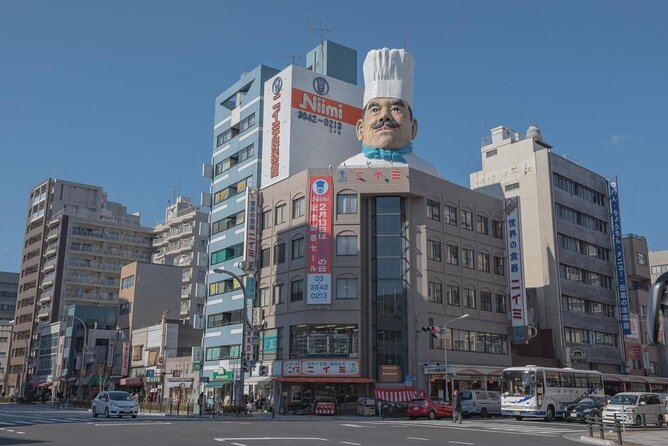
- The tour explores the history and culture of Asakusa, culminating in visits to renowned Japanese kitchen knife stores on Kappabashi Street.
- Participants wear headsets to clearly hear the guide’s narration during the tour, ensuring an immersive experience for groups of three or more.
- The tour provides a unique opportunity to witness the craftsmanship and tradition behind Japanese knives, with the guide offering insights into the art form.
- The tour operates on a fixed schedule, starting promptly at 9:30 am, with the guide maintaining a steady pace throughout the history tour and kitchen knife store visits.
- While the tour is not wheelchair accessible, the small group size allows the guide to tailor the experience to the interests and questions of the participants.
Overview of the Tour
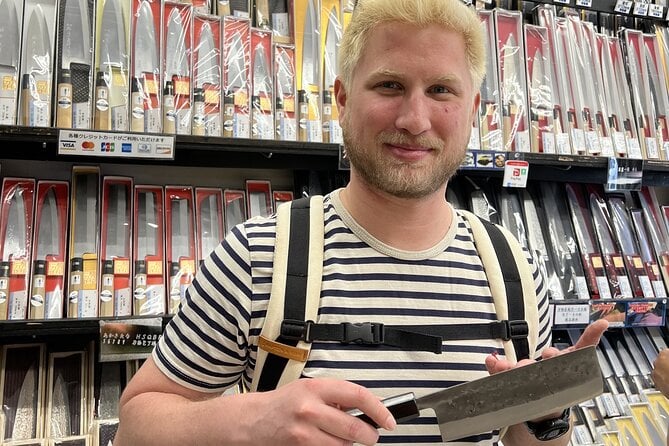
The tour begins with participants donning headsets to clearly hear the guide’s narration as they embark on a journey exploring the rich history and culture of Asakusa. This experience is designed for groups of three or more, ensuring that each person can fully enjoy the tour.
After the historical exploration, the group moves on to the highlight of the tour – visiting Japanese kitchen knife stores. Here, they can witness the craftsmanship and attention to detail that goes into creating these exceptional culinary tools.
Whether a seasoned chef or a curious foodie, this tour offers a unique opportunity to discover the art and tradition behind Japanese knives.
Ready to find more treasures? More shopping adventures we recommend in Tokyo
Meeting and Pickup Instructions
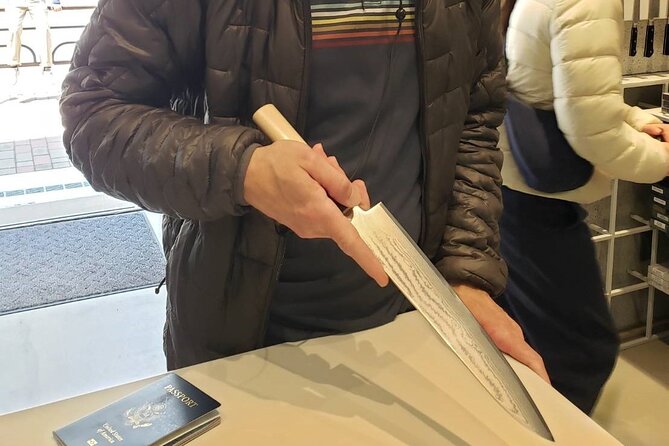
Participants meet up with the tour guide in front of a Burger King restaurant next to Exit 4 of Asakusa subway station (G19) on the Ginza line, where the tour kicks off.
Once the group has assembled, the guide provides each participant with a headset to ensure they can clearly hear the tour commentary throughout the experience.
This setup allows for a seamless and engaging tour, even for larger groups of 3 or more travelers.
At the end of the history tour, the group will make their way to the Kappabashi Kitchen Tools Street, the final destination of the day’s activities.
Tour Start Time and Duration
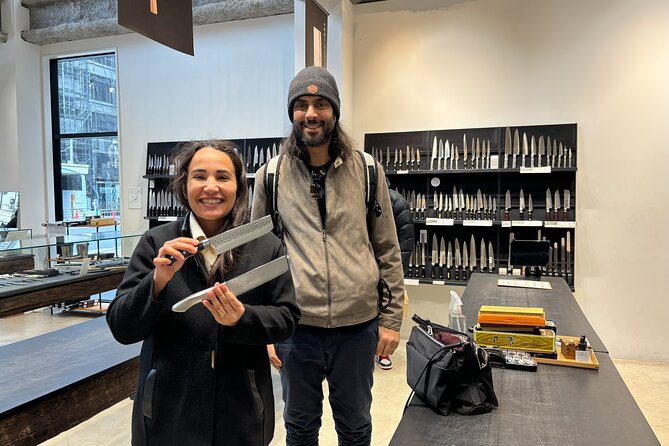
The tour kicks off promptly at 09:30 am, allowing participants to make the most of their time in Asakusa.
Though the total duration of the experience isn’t specified, the guide ensures the pace remains steady throughout the history tour and kitchen knife store visits.
The tour includes:
- A guided exploration of Asakusa’s rich history and cultural landmarks.
- Visits to renowned Japanese kitchen knife shops on Kappabashi Street.
- Opportunities to learn about the craftsmanship and techniques behind traditional Japanese knives.
- Time for participants to browse and potentially purchase unique kitchen tools and souvenirs.
With a focus on making the most of the limited time, the tour provides a well-rounded cultural and culinary experience in the heart of Tokyo.
Maximum Group Size
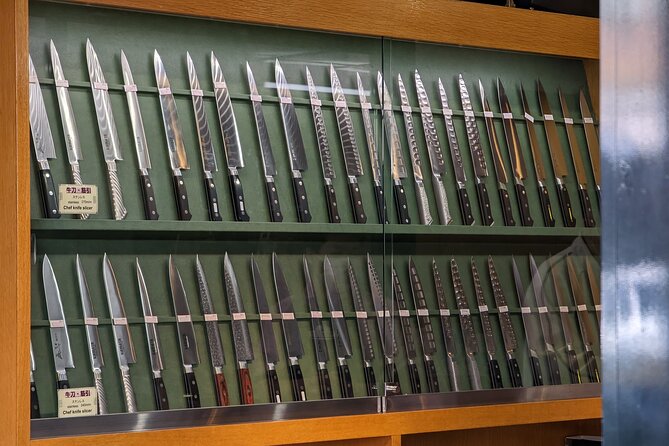
A maximum of 8 travelers can join this immersive experience, ensuring an intimate and personalized tour.
The small group size allows the guide to provide each participant with individualized attention, fostering a more engaging and interactive exploration of the Japanese kitchen knife stores.
This intimate setting enables the group to delve deeper into the rich history and craftsmanship behind these culinary tools, as the guide can tailor the experience to the specific interests and questions of the group.
Cancellation Policy Details
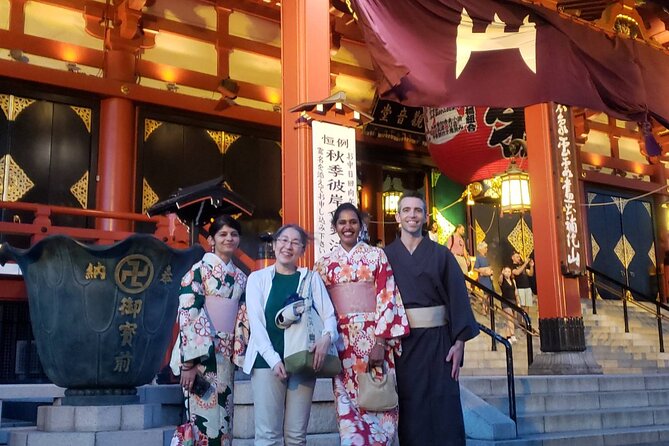
This tour offers a flexible cancellation policy, providing travelers with the option to receive a full refund if they cancel the experience at least 24 hours prior to the start time.
However, no refund is available for cancellations made less than 24 hours before the tour’s commencement. This policy ensures that the tour operator can effectively manage group sizes and accommodate last-minute changes without undue financial burden.
The cancellation policy includes the following key details:
- Full refund available for cancellations made at least 24 hours in advance.
- No refund for cancellations less than 24 hours before the start time.
- Policy designed to maintain tour logistics and accommodate changes.
- Allows the operator to manage group sizes effectively.
Fascinated by Tokyo's past? More historical tours we've covered
- From Tokyo Niko World Heritage Tour With English Driver
- From Tokyo: 1 Day Private Tour to Nikko World Heritage Sites
- From Tokyo: Private Historical Day Trip to Kawagoe
- 60-Min Samurai Hands-On Seminar for History Lovers + Photo Time
- Asakusa: Visits to Kitchen Knife Stores After a History Tour
- Tokyo Asakusa Food Tour a Journey Through the History and Culture
Accessibility and Infant Seating
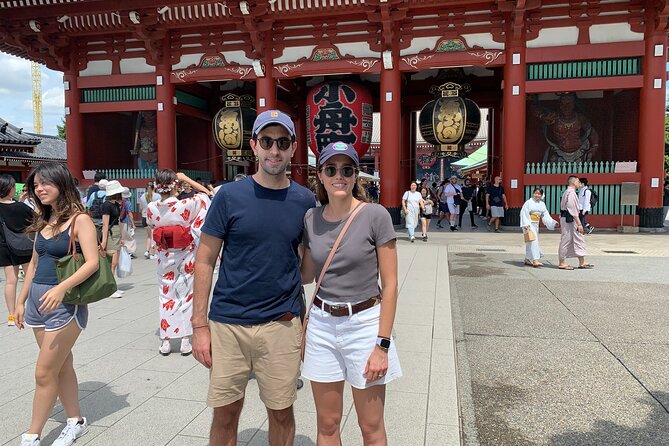
Accessibility and Infant Seating
The tour isn’t wheelchair accessible, limiting accessibility.
Infants must sit on laps throughout the experience, which may pose a challenge for families with young children.
The tour is designed for most travelers to participate, but those with mobility issues or traveling with babies should consider the constraints.
The narrow streets and shops along Kappabashi Kitchen Tools Street may also present difficulties for those who require additional accessibility accommodations.
Traveler Participation Requirements
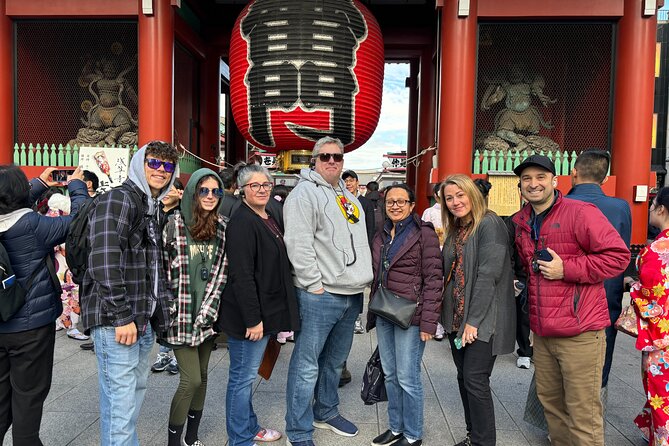
Most travelers can partake in this immersive experience exploring Japanese culinary culture, though the tour may pose challenges for those with specific accessibility needs.
The tour welcomes participants of all ages, with infants able to sit on laps during the experience. While the tour isn’t wheelchair accessible, the organizers do their best to accommodate visitors with mobility limitations.
To ensure an engaging and informative journey, the tour provides headsets for each participant, allowing everyone to clearly hear the guide’s insights.
Booking Confirmation Process
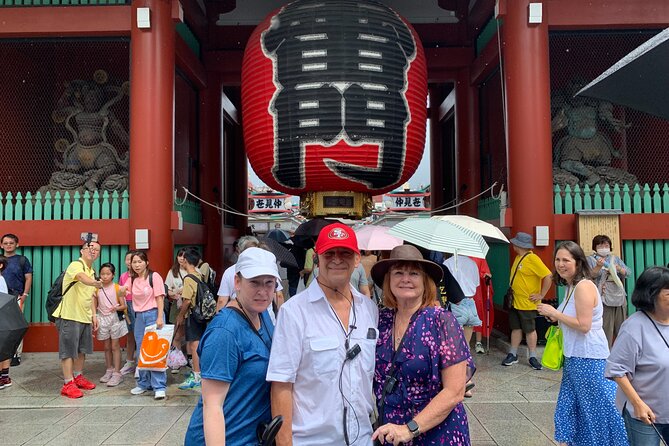
Travelers receive confirmation of their booking immediately after completing their reservation for the Asakusa kitchen knife store tour. The confirmation provides all the important details, including the meeting point, start time, and tour duration.
It also reminds participants about the cancellation policy, which allows for a full refund if the tour is canceled at least 24 hours in advance. This ensures travelers have the necessary information and can plan their day accordingly.
The confirmation also notes that the tour isn’t wheelchair accessible and infants must sit on laps, so travelers can make the appropriate arrangements.
Frequently Asked Questions
Are There Any Special Requirements for the Kitchen Knife Store Visits?
The kitchen store visits may have special requirements. Participants typically receive headsets to hear the guide clearly. Group sizes are limited, and the tour may not be wheelchair accessible. Visitors should check the tour details for any additional requirements.
What Types of Kitchen Knives Can Be Purchased During the Tour?
During the tour, visitors can purchase a variety of traditional Japanese kitchen knives, including the iconic santoku, nakiri, and deba knives. The stores offer a wide selection of high-quality blades crafted by skilled local artisans.
Can Participants Bring Their Own Kitchen Knives for Sharpening?
Participants can’t bring their own kitchen knives for sharpening during the tour. The focus is on visiting local Japanese knife stores and learning about traditional knife-making techniques, not providing sharpening services for personal knives.
Are There Any Food or Drink Options Available During the Tour?
The tour does not include any food or drink options. Participants are responsible for bringing their own sustenance during the experience. The focus of the tour is on exploring Japanese kitchen knife stores, not on dining.
Can the Tour Be Customized for Specific Dietary or Cultural Needs?
The tour can likely be customized to accommodate specific dietary or cultural needs, such as providing vegetarian or halal options. Travelers should inquire about any special accommodations when booking the tour.
Recap
The Asakusa tour provides a captivating glimpse into Japan’s rich cultural heritage, culminating in an immersive exploration of the renowned Kappabashi Kitchen Tools Street.
Witnessing the skilled craftsmanship behind traditional Japanese knives offers a unique opportunity to appreciate the art and traditions that have been passed down for generations.
This tour promises an unforgettable experience for those seeking to delve deeper into the heart of Japanese culture.
More Historical Tours in Tokyo
- Tokyo: Shogun History Tour Visiting 3 Significant Shrines
- Historical Journey Including Akasaka Palace Admission Ticket
- Tokyo to Kawagoe: Private Historical Day Trip
- Nikko Heritage Private Tour With English Guide From Tokyo
- Old Tokyo History Coffee Gardens and Traditional Street Food
- Tokyo Skytree History Tour From Asakusa Subway Station
More Tours in Tokyo
- Tokyo: Shinjuku Local Bar Hopping Tour 3 Authentic Izakayas
- Tokyo Tsukiji Fish Market Food and Walking Tour
- Tokyo by Night Photography Tour
- 3hr Private E-Bike Cycling Tour in Tokyo, Starting at Your Hotel
- Tokyo Private Driving Tour by Car/Van – English Speaking Driver
- Customizable Private Tour in Mt. Fuji With Private Driver
More Tour Reviews in Tokyo
- Tokyo: Shinobi Samurai Premium EXP for Solo Travelers, 90min
- Mt Fuji Private Tour With English Speaking Driver
- Nerikiri Wagashi-Making With Tea Ceremony Review
- Tokyo 3-Hour Guided E-bike Cycling Tour of the Citys Hidden Gems
- Official Street Go-Kart Tour – Shinagawa Shop
- 【Open 1st Anniv.】Popular Sushi Making Class Near Tokyo Tower
Not for you? Here's more things to do in Tokyo we have recnetly reviewed
- 2 Best Craft Beer Tours And Tastings In Tokyo
- 20 Best 2 Day Tours In Tokyo
- 7 Best 3 Day Tours In Tokyo
- 6 Best 4 Day Tours In Tokyo
- 25 Best Cruises And Boat Tours In Tokyo
- 25 Best Food Tours In Tokyo
- 20 Best Full-Day Tours In Tokyo
- 15 Best Helicopter Flights And Tours In Tokyo
- 2 Best BBQ Experiences In Tokyo
- 5 Best Coffee Tours And Tastings In Tokyo
- 25 Best Lunch Experiences In Tokyo
- 12 Best Massage And Relaxation Services In Tokyo
